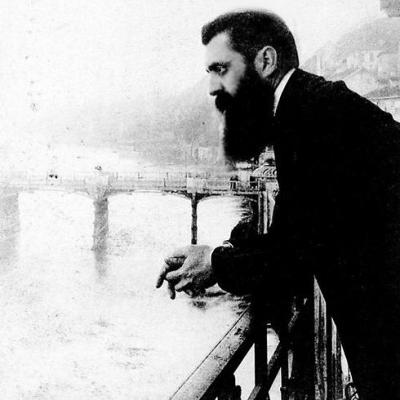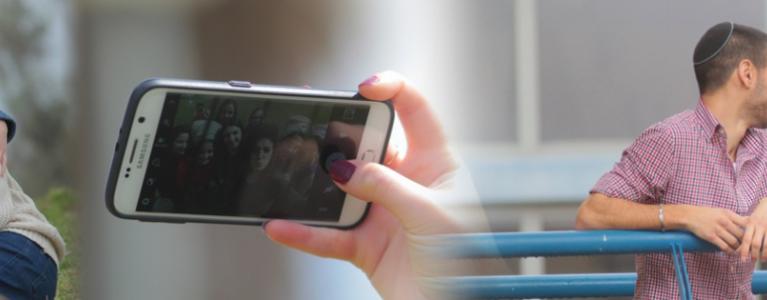
Dr. Yoram Elmakayes, head of the department for The Land of Israel Studies, Orot Israel College, Elkana
On the 20th of Tammuz in the year 5664 (1904), Theodor Herzl passed away. Five years earlier (in Cheshvan 5659), he had managed to take a brief trip to the Land of Israel, with the highlight of his visit being Jerusalem. Herzl was deeply moved by his visit to the holy city, but had mixed feelings about it. Nevertheless, there's no doubt that the city left a profound impression on him that lingered for a long time. Herzl documented his observations and experiences from that visit in his writings, and it is fitting, especially during these Bein ha-Metzarim days, to bring up his words here.
Since the passing of Herzl, it has become customary every year to commemorate the anniversary of his death on the 20th of Tamuz both in Israel and abroad and to deliver eulogies in his memory. Many have seen and continue to see in him a leader of towering stature who appears once in several generations. Rabbi Kook ZT"L wrote a special eulogy for Herzl called "The Eulogy in Jerusalem," in which he emphasized his messianic-nationalist role as laying "the proper foundation for all the great and holy plans that Israel excels in" ('The Eulogy in Jerusalem', Writings of Rabbi Kook, Vol. 1, p. 94). For example, this is how David Ben-Gurion expressed his thoughts after hearing the news of Herzl's death: "No more will there arise such a wonderful man, who combines in him the valor of the Maccabees with the stratagems of David, Rabbi Akiva's courageous heart who died 'as one,' and Hillel's humility, the beauty of Rabbi Yehuda HaNasi and the fiery love of Rabbi Yehuda HaLevi; only once in thousands of years is such a remarkable man born!" (David Ben-Gurion in a letter to his friend Shmuel Pukh, 1904). In his eulogy, the rabbi of Cairo, Rebbi Aharon Ha-kohen in 1918, he declared: “That is why his name was “Herzl”, as his name, so is he. The Hebrew translation for the name Herzl is "the heart," because the essence is the heart, for in his entire heart, he thought to do good for his people... and through Zionism, they all are in one voice: Zion and Jerusalem." (From: 'The Nation's Heart - Herzl in the Eyes of His Generation's Rabbis,' by Moshe Nahmani).”
Herzl arrived in Jerusalem by train, on the eve of Shabbat, the 13th of Cheshvan, 1898, just as the Sabbath began. Due to the sanctity of the Sabbath, Herzl, despite his weariness and fatigue from the long journey, had to walk on foot from the old train station in Jerusalem to the Kaminitz Hotel (today, near Davidka Square).
Herzl’s first encounter with Jerusalem sights was undoubtedly a very touching and memorable moment. So tells eyewitness Aviezer Yellin: "Here, we depart from the train station, here, we begin descending along King's Road, towards Sultan’s pool and Ben-Hinnom Valley, and suddenly a sight is revealed that will not be forgotten: far, far on the horizon, to the east, the Moab Mountains, draped with a thin veil of thinness, laden with secrets and mysteries, and closer still the wall of the ancient city in its southwestern corner. And above all, the pale and gentle light of the full moon is poured. The vision left a deep impression on him."
He remained standing, rooted in place. His dreamy eyes, his penetrating gaze, took him to distant places and vast horizons. Herzl was deeply moved to the core of his being, and his eyes began to shed tears that slowly rolled down his cheeks, seeping into the hair of his black beard... It is no wonder wonder, then, that when the legendary glow of the moonlight revealed before him the walls of Jerusalem, the silhouette of the Mount of Olives against its ruined tower, and Zion above David's tomb, with the Valley of Ben Hinnom stretching out at his feet and, in the distance, the suggestive Moab Mountains— it is no wonder that at that moment Herzl was beside himself, remaining rooted in place as a 'warm current flooded his eyes and the tears rolled slowly down his cheeks'. For a long hour, Dr. Herzl remained standing like this without uttering a sigh. Only the word 'Jerusalem' haunted his lips... (Aviezer Yellin, Maariv, November 1, 1968)
Herzl himself testified on the excitement that held him. Two days later, he writes in his journal: “Although I am exhausted, Jerusalem, with its Jerusalem, veiled by a thin crescent of the moon, on its wondrous horizons left a deep impression on me.” Wondrous are the shadows of David Citadel, of the Tower of David. The streets are full of Jewish people, strolling for their enjoyment in the moonlight. I am merely looking through the windows and see Jeruselm, dwells in her splendour. Even in its ruin, to this day, Jerusalem is a beautiful city, and it can, if we come back here, once again be one of the most beautiful cities in the world…" (Herzl, Diary 31-28/10/1898)
Despite Herzl's excitement, he walked wearily and with difficulty all the way to the hotel, where he and his small delegation were surprised to find that the hotel rooms they had reserved were taken by the German emperor's delegation... Herzl didn't really manage to rest that Shabat. However, he took advantage of the time to go out and wander around Jerusalem. One of the first places they visited was the Mount of Olives, from which they could take in the view of the entire city. Herzl gazed, impressed, and already envisioned the future of the city. He described it in his diary as follows:
"In the afternoon, we were on the Mount of Olives. Magnificent sights. What can't be done with this scenery! ... I would treasure the Old City with its holy remnants, I would treasure as if within a capsule, extracting from it all means of transportation, within the ancient walls, only houses of prayer and charity institutions will remain. And on the slopes of the hills all around, which will turn green as a result of our work, a splendid New-Jerusalem will be established. Those dandified people from all parts of the world will journey to the Mount of Olives. If nurtured, Jerusalem will become an enchanting abode. All that is sacred - to be preserved within the old walls; all that is new - to be spread around... We delighted in the sight of the Temple Mount, the Mount of Olives, and all this legendary landscape, in the pre-noon sun. I am thoroughly convinced that it is possible to establish outside the walls of the Old City a splendid New Jerusalem. A very elegant and beautiful city can definitely be located next to this ancient one.
Not all that Herzl saw pleased him. In his vision, he aspired for a modern and developed capital city, much more than what he saw on his visit: "When I contemplate you in the future, Jerusalem, it will not be with joy."
"The dark deposits of thousand years are steeped in inhumanity, intolerance, and pollution permeating the bustling alleys... If we ever receive Jerusalem and if I can still take any action when the time comes, then first and foremost, I will cleanse it of its filth. Everything that is not of a holy nature will be removed, I will establish workers' neighborhoods outside the city, I will eradicate the stains of pollution, destroy them, burn the non-sacred ruins, and transfer the markets elsewhere. Afterward, a new city will be built around the holy sites, comfortable, well-ventilated, and efficient..." (Herzl, Travel Diary, October 30, 1898).
Herzl’s visit to Jerusalem was brief and politically unsuccessful. His meeting with the German emperor was not fruitful and disappointed Herzl left the city shortly thereafter. Nevertheless, he carried the memory of Jerusalem with him for years to come. Not coincidentally, Herzl requested in his will to have his remains brought to the Land of Israel. Indeed, on the 22nd of Av 1949, the remains of the Visionary of the State were brought to Jerusalem. How symbolic it was that the Prime Minister named David (Ben-Gurion) initiated the bringing of the ark containing the 'sacred' relic of national significance (Herzl). The casket containing the sacred relic was loaded and transported to Jerusalem, positioned at the summit of the hill that would become the national center of the new capital city. It's remarkable that the Maariv newspaper expressed that "they buried him in the City of David..." (Maariv, August 15, 1949).
Herzl, The Visionary of State returned to Jerusalem one last time. The moving words of the eulogy by Rabbi Aharon HaKohen ZT"L are touching, in which he continues to link the memory of Herzl with the memory of Jerusalem: “Therefore, I call upon him the verse ‘Speak to the heart of Jerusalem and call out to her’ (Isaiah 40:2), for Dr. Herzl is called the heart of Jerusalem, for we believe that through the pure hearts of Israel, and foremost among them Dr. Herzl, who with all their hearts sought Zion and Jerusalem…”
And in the building of Jerusalem, we shall find comfort. Amen.


